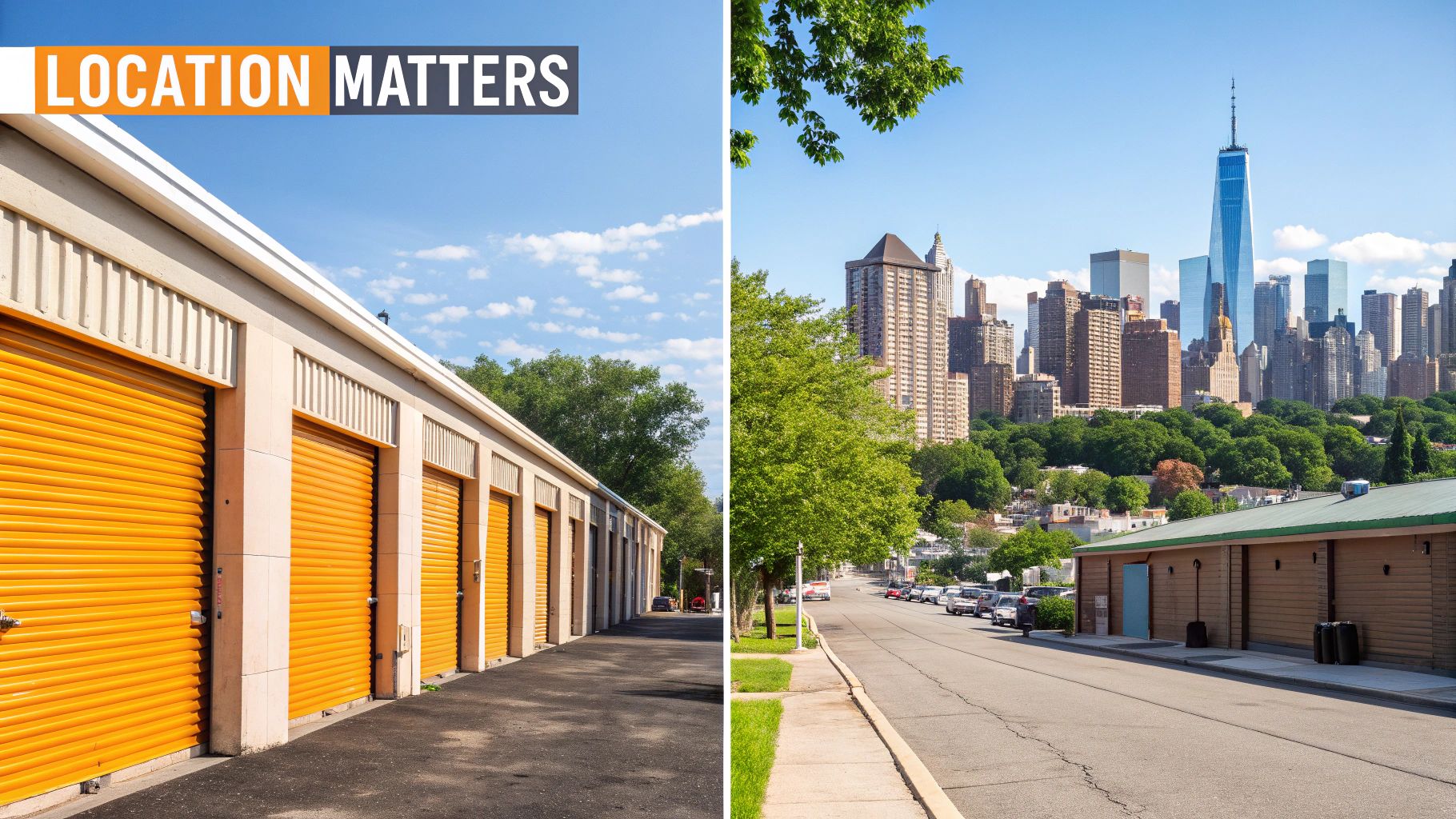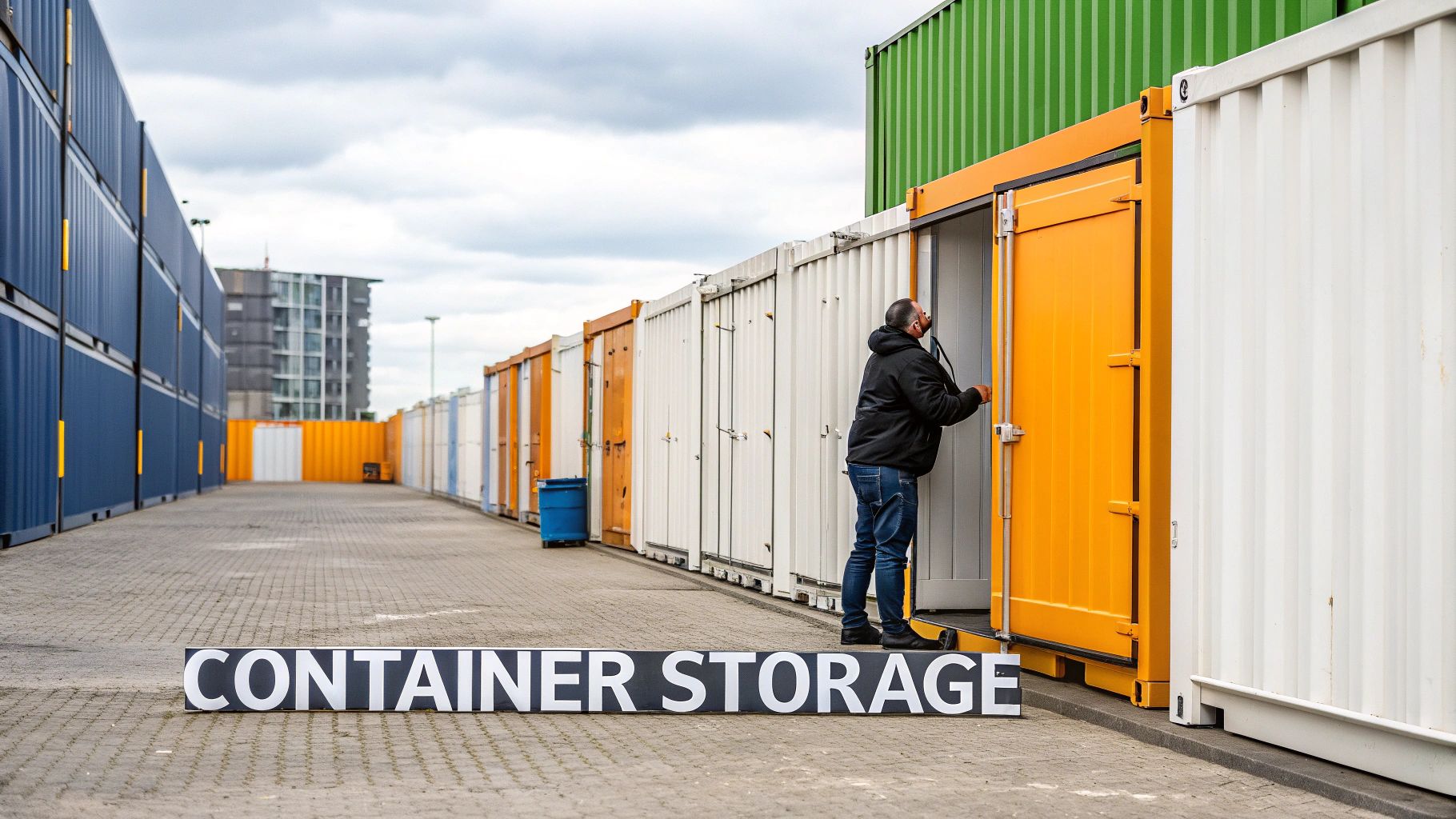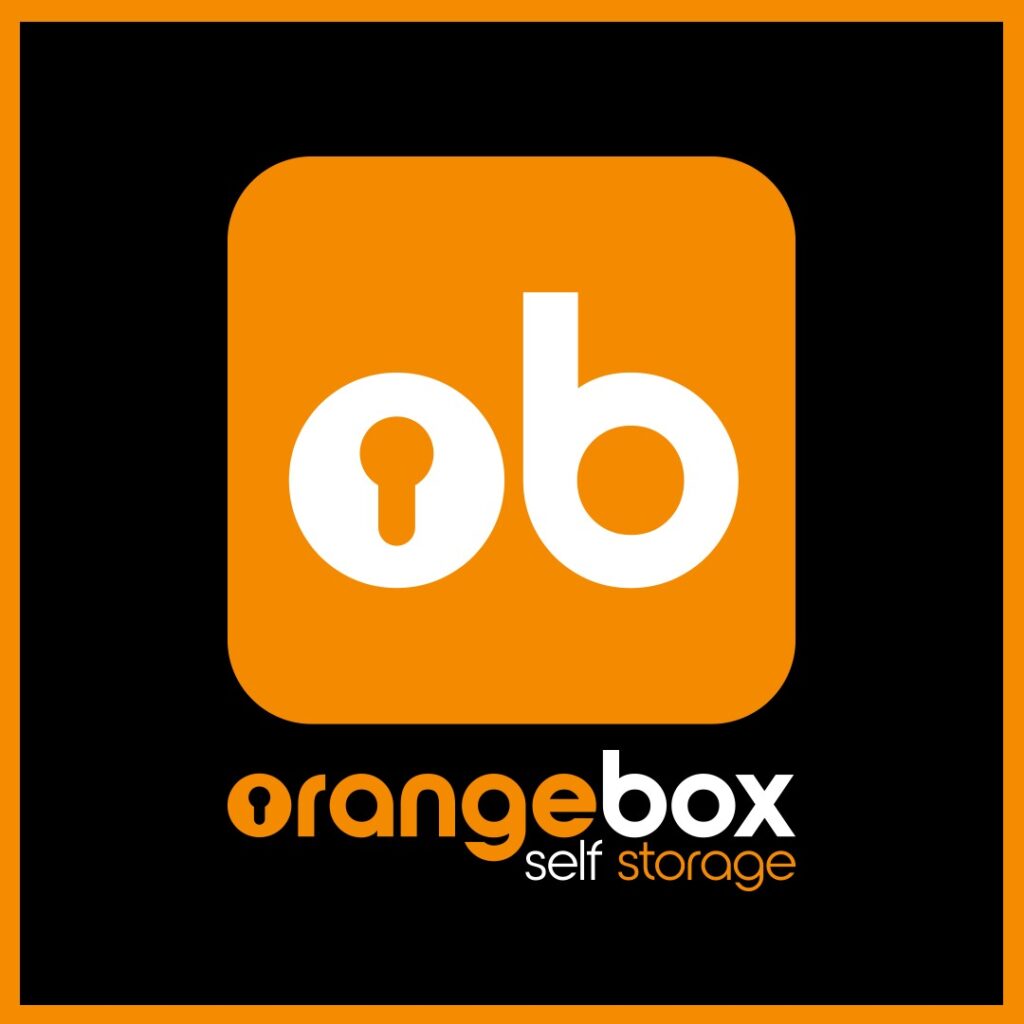Working out the cost of a storage unit in the UK is a bit like budgeting for a car—the final price tag really depends on the model and size you go for. On average, you can expect to pay anywhere from £15 per week for a small 25 sq ft unit up to £65 per week or more for a large 150 sq ft space.
Of course, these figures can swing quite a bit depending on where you are in the country and what features you need.
What Is the Average Cost of a UK Storage Unit?
A small locker designed for a few boxes will naturally have a much lower weekly price than a garage-sized unit meant to hold the contents of a three-bedroom house. Getting your head around these differences is the first step to setting a budget that makes sense for you.
To give you a clearer picture, let's break down the typical weekly costs you're likely to see across the UK for the most common unit sizes. Think of this as a solid starting point before we get into the nitty-gritty of what can push these prices up or down.
Average Weekly Cost of UK Storage Units by Size
The table below gives you a ballpark estimate of weekly rental prices for standard self-storage units. These figures are an average from across the country, providing a helpful baseline for your planning.
| Unit Size (sq ft) | Typical Use | Average Weekly Cost (Low End) | Average Weekly Cost (High End) |
|---|---|---|---|
| 25 sq ft | Contents of a garden shed or student room | £15 | £25 |
| 50 sq ft | Contents of a one-bedroom flat | £25 | £40 |
| 100 sq ft | Contents of a two-bedroom house | £40 | £60 |
| 150 sq ft | Contents of a three-bedroom house | £60 | £85 |
As you can see, the price jump between sizes is pretty significant. This really hammers home why choosing the right unit size is so important for keeping costs down.
This infographic helps visualise just how much the weekly costs can differ between small, medium, and large storage units.

If you're struggling to picture what fits into each space, our detailed storage unit size guide offers practical examples and comparisons. It's the best way to make sure you only pay for the space you genuinely need.
How Your Location Dictates Storage Prices

Just like the price of a flat, the cost of a storage unit in the UK is tied directly to its postcode. It’s no surprise that a unit in the heart of London or Manchester will set you back more than an identical one in a quieter, suburban town.
This isn’t random—it boils down to the simple economics of property values and running costs. The land a storage facility sits on is its single biggest expense. So, when land prices and business rates are sky-high in dense urban centres, those costs inevitably get passed on to you.
On the flip side, facilities in less populated areas have lower property costs, which means they can offer much more competitive rates. The price difference can be pretty dramatic, potentially saving you a tidy sum on your monthly bill.
Urban Premiums vs Suburban Savings
The price gap between city-centre storage and options on the outskirts is often stark. A storage unit in central London can easily cost 30-50% more than a similar one in a Home County town that’s just a short drive away. It’s a crucial factor to keep in mind when you’re budgeting.
To put it in perspective, renting a 100 sq ft unit might cost you over £70 per week in a prime city location. But if you’re willing to look just 10-15 miles out, that price could drop closer to the national average of £40-£60 per week.
This leaves you with a clear trade-off:
- Urban Storage: You get maximum convenience, which is perfect if you live and work centrally and need to pop in and out. But you pay a hefty premium for that proximity.
- Suburban or Rural Storage: This is where you’ll find the real savings, but it means a longer trip to access your belongings. It’s the ideal choice for long-term storage where you won’t be visiting all that often.
Key Takeaway: The convenience of a nearby city storage unit comes at a price. If you don't need daily or weekly access, expanding your search radius by just a few miles can unlock considerable savings on your total storage cost.
Weighing Convenience Against Cost
So, should you pay more for a local unit or travel for a cheaper one? It really comes down to what you need it for.
If you're running an e-commerce business and need to grab stock every day, a pricier city-centre unit is probably a non-negotiable business expense. The time saved is worth the extra cash.
But if you’re just stashing furniture during a house move or decluttering seasonal items, the savings from a facility further afield are well worth the occasional drive. Before signing any contract, be honest with yourself: how often will you realistically need to visit your unit? A 30-minute drive once every few months could save you hundreds of pounds over the year, making it a very smart financial move.
Decoding the Hidden Factors in Your Storage Bill

While the size of the unit and its location are the big-ticket items, a few other details can quietly shape the final figure on your bill. The advertised weekly rate is just the starting point; understanding the fine print is crucial for getting a real handle on the cost of a storage unit in the UK.
It’s a bit like booking a flight. The initial price looks tempting, but once you add extras like seat selection and checked baggage, the total can climb. In the world of self-storage, your contract length, the level of security, and any special features you opt for will all influence your monthly payment.
When you're comparing quotes, it's easy to focus just on the weekly price. But a truly savvy search involves looking at the whole picture. Let's break down the main factors that can either inflate your bill or, if you're clever, save you some cash.
Main Factors Influencing Storage Unit Prices
| Pricing Factor | Description | Impact on Cost |
|---|---|---|
| Contract Length | The duration of your rental agreement, from a flexible month-to-month to a fixed long-term contract of six months or more. | Longer commitments often unlock significant discounts, while short-term rentals usually command a higher weekly rate. |
| Security Features | The level of protection offered, ranging from basic padlock access to facilities with 24/7 CCTV, individual unit alarms, and on-site staff. | Premium security features add to the facility's overheads, which is reflected in a higher price for the customer. |
| Climate Control | Specialised units that maintain a consistent temperature and humidity level, protecting sensitive items from damp, mould, and extreme cold. | This is a premium feature. Expect to pay a notable amount more for a climate-controlled unit compared to a standard one. |
| Access Hours | The times you can access your unit. Some facilities offer standard business hours, while others provide 24/7 access via a keycode. | The convenience of 24-hour access almost always comes at a higher cost. |
| Mandatory Extras | Additional costs that may be required by the facility, such as compulsory insurance, a one-off admin fee, or a new padlock. | These are often "hidden" costs that can add a surprising amount to your initial outlay if you're not prepared. |
As you can see, the advertised price is really just the beginning. Now let's dig into what some of these factors mean for your wallet.
Your Contract Length and Flexibility
One of the biggest variables is how long you plan to keep your things in storage. Much like a mobile phone contract, many facilities will offer you a better deal for a longer commitment. It's a win-win: they get a reliable customer, and you get a lower monthly bill.
- Short-Term Rentals: Need a unit for just a month or two while you move house? You’ll likely pay the standard weekly or monthly rate. It gives you maximum flexibility but at a premium price.
- Long-Term Discounts: If you can commit to six months or even a year, you can often unlock a discount. It’s not unusual to see monthly bills drop by 10-20%. Always ask what deals are on the table for longer stays.
This pricing strategy is partly driven by high demand across the industry. With national average occupancy rates often sitting above 90%, facilities can afford to be selective, favouring stable, long-term contracts. While there's been a slight dip in demand linked to the housing market, the sector remains robust, giving providers little reason to slash prices for short-term renters. You can discover more insights about the UK storage market and its future trends.
Security and Special Features
Not all storage units are built the same. The level of protection and the bells and whistles on offer can make a real difference to the price. A basic unit in a compound with a simple padlock will naturally cost less than one in a state-of-the-art facility.
Premium features that will bump up your bill include:
- 24/7 CCTV Monitoring: Constant surveillance gives you peace of mind, but it also adds to the facility's running costs.
- Individually Alarmed Units: These offer an extra layer of security, triggering an alarm if your specific unit is breached.
- Climate Control: If you're storing sensitive items like electronics, antique wooden furniture, or important documents, this is a must. These units keep temperature and humidity stable, preventing damage from damp or extreme cold. You should always expect to pay more for this.
- 24-Hour Access: The ability to get to your unit at 3 a.m. is a fantastic convenience, but it's one you'll often have to pay for.
Important Note: Always double-check what security features come as standard. Some places bundle everything into one price, while others offer tiered packages. This is a critical detail to clarify when you're comparing the cost of different storage units.
Finally, don’t get caught out by the "hidden" extras. Things like mandatory insurance, a one-off administrative fee, and even a refundable security deposit can all add to your initial outlay. Before you sign anything, always ask for a full, itemised breakdown of costs to avoid any unwelcome surprises down the line.
Exploring Container Storage as a Cheaper Alternative
When you picture a storage unit, you probably think of a traditional indoor facility—long hallways lined with brightly coloured doors. But there’s another option that’s practical, secure, and often much kinder to your wallet: container storage.
Think of it like choosing between a high-street shop and an out-of-town retail park. The high-street spot is polished and right in the middle of everything, but the retail park offers a lot more space for less money. Container storage works on a similar principle, giving you a robust steel container, usually at ground level, often for a fraction of the cost of an indoor unit.
Why Is Container Storage Often Cheaper?
It all comes down to construction and overheads. Putting up a massive, multi-story indoor storage building is a huge investment in pricey land and complex construction. Container sites, on the other hand, are much simpler to set up, often on more affordable land, and those savings get passed straight on to you.
This no-fuss, high-value approach has helped it boom. The UK self-storage industry is now home to 2,915 total sites, and an incredible 1,135 of these are container storage facilities. This growth is especially strong in rural and semi-rural areas where land costs are lower, making it a seriously competitive choice.
Looking into various storage solutions beyond the typical indoor unit can unlock some serious savings. If you just need a big, secure space and aren't storing anything too delicate, containers are a fantastic option.
Key Differences and Trade-Offs
While the lower price is a massive plus, it’s important to know what you’re trading for it. Most containers aren't climate-controlled, which means they can get hot in the summer, cold in the winter, and sometimes experience a bit of condensation. This makes them perfect for things like garden tools, building materials, or well-packed household goods, but maybe not the best for sensitive electronics, antique wooden furniture, or important documents.
Key Consideration: The main trade-off is climate control versus cost. If your items are robust and can handle changing temperatures, container storage offers unbeatable value for money.
Security is still a top priority, don’t worry. Most sites are kitted out with CCTV, secure perimeter fencing, and heavy-duty locks. And let’s not forget one of the best perks: the ability to drive right up to your unit’s door to load and unload. It’s a huge time-saver. If this sounds like the right fit, you can easily find affordable container storage near me and see what local prices look like.
How Businesses Use Storage to Cut Costs

Self-storage isn't just for moving house or hiding away Christmas decorations. For a growing number of UK businesses, it’s become a savvy way to manage overheads and operate more efficiently, which directly shapes the overall cost of a storage unit in the UK for commercial use.
Think about it: renting a traditional warehouse or a high-street retail unit comes with eye-watering price tags and restrictive, long-term leases. Self-storage flips that model on its head, offering a far more agile and affordable alternative.
This flexibility frees up vital capital for small businesses and startups, allowing them to scale their space up or down as their needs change—without getting locked into an expensive contract.
Who Uses Business Storage
From tradespeople to online retailers, all sorts of businesses are making self-storage a core part of their operations. It’s a clever way to sidestep the high costs and long-term commitments tied to conventional commercial property.
- E-commerce Sellers: Instead of letting stock take over their homes, online sellers use storage units as mini-warehouses. Many facilities will even accept deliveries on their behalf, which is a massive help for streamlining the entire fulfilment process.
- Tradespeople: Electricians, plumbers, and builders often use units to securely store their tools and materials. Drive-up access at many sites makes it dead simple to load and unload gear for the day's jobs.
- Document Archiving: Businesses can free up precious office space by moving important documents off-site to a secure, dry unit.
The trend is pretty clear. Commercial users like tradespeople and e-commerce sellers now make up about 17% of all storage clients. Even more telling, a remarkable 24% of users actually run their business from their unit, proving just how vital these spaces have become as micro-hubs for small enterprises.
Key Insight: For many entrepreneurs, a storage unit is more than just extra space—it's a cost-effective operational base that offers a kind of flexibility traditional property just can't match.
Our guide to self-storage for businesses dives into more detail on how different industries are making it work for them. For businesses looking at even longer-term strategies, investing in their own facility can be a consideration. A comprehensive resource on this is the commercial metal building cost guide.
Actionable Tips to Lower Your Storage Bill
Knowing the average cost of a storage unit in the UK is a good start, but actively shrinking that bill is where the real magic happens. With a few smart moves, you can often land a much better deal than the standard price you see online, keeping more money in your pocket each month.
It really all comes down to thinking ahead. Too many people just accept the first quote they get, but facilities nearly always have discounts and promos that aren't advertised in big flashy letters. A bit of digging and a friendly chat can go a surprisingly long way.
Be Smart with Your Space
The most direct way to slash your costs is to rent less space, and that begins with packing like a pro. Think of it as a game of Tetris; the goal is to leave as little empty air as possible.
- Dismantle Furniture: Take beds, tables, and bookshelves apart. It's a bit of extra work upfront, but it dramatically shrinks their footprint, letting you squeeze more into a smaller area.
- Use Uniform Boxes: Stacking boxes of the same size is much more stable and space-efficient than wrestling with a random jumble of shapes and sizes.
- Fill Every Gap: Get creative. Pack smaller items inside bigger ones, like stuffing books into a chest of drawers or clothes into a wardrobe.
By packing this strategically, you might find you only need a 50 sq ft unit instead of a 75 sq ft one—that's a hefty saving week after week.
Pro Tip: Create a detailed inventory list as you go. Not only does it keep you organised, but it also means you can find that one specific box later without having to pull everything out.
Hunt for Deals and Discounts
Never take the price you see online as the final word. The self-storage world is competitive, and there are almost always ways to get a better rate if you know where to look and what to ask for.
Just being a little flexible and planning ahead can unlock some of the best offers out there.
- Book Online: Many companies dangle exclusive online-only discounts or introductory deals, like "50% off your first eight weeks," which can lead to huge initial savings.
- Ask About Long-Term Rates: If you know you'll need storage for six months or more, always ask about a long-term discount. Facilities love the security of a longer contract and will often knock down the monthly rate in return.
- Shop Around for Insurance: While insurance is pretty much always mandatory, you don't have to buy it from the storage provider. First, check if your home contents policy already covers stored goods. If not, compare quotes from third-party insurers who often have much cheaper rates.
- Be Flexible with Timing: If you can swing it, try to avoid moving in during peak times like the end of the month or over student holidays. You'll often find better promotional pricing during quieter, off-season periods or even mid-week.
Got Questions About UK Storage Costs? We’ve Got Answers.
Figuring out the fine print of a storage agreement can feel a bit overwhelming. To cut through the confusion, we've gathered the most common questions we get about the cost of a storage unit in the UK and answered them in plain English.
Think of this as your go-to guide for all the practical, money-related questions that pop up. It’s everything you need to know to feel confident before you sign on the dotted line.
Do I Have to Pay a Deposit for a Storage Unit?
Yes, most of the time you will. It's standard practice across the UK for facilities to ask for a refundable security deposit, which is usually the equivalent of one or two weeks' rent.
Don't think of it as a hidden fee; it's more like a safety net for the storage company. It covers them if the unit gets damaged or needs a serious clean-up after you've moved out. As long as you leave the unit in the same state you found it, you’ll get that money back in full. Some places might also charge a small, one-off admin fee to get your account set up, so it's always a good idea to ask for a complete breakdown of any upfront costs.
Is Insurance Mandatory for My Stored Goods?
You can bet on it. Almost every storage facility in the UK will require your goods to be insured. This is a big one because the cost of insurance is rarely, if ever, included in that tempting weekly rental price you see advertised.
Important Reminder: The facility’s own insurance covers their building, not what’s inside your unit. You’re responsible for protecting your own belongings against things like fire, theft, or water damage.
While most facilities will happily sell you their own insurance policy for convenience, you're not locked into buying it from them. You can often find a much better deal by checking if your current home contents insurance can be extended to cover items in storage. Another great tip is to shop around with third-party insurers – a few minutes comparing quotes could lead to some pretty decent savings.
Can the Price of My Storage Unit Increase?
It can, and this is definitely something to keep an eye on. Many of those eye-catching deals, like "50% off for the first two months," are just introductory offers. Once that initial period is over, your rate will almost certainly jump back up to the standard price.
On top of that, most rental agreements have a clause that allows for annual price reviews to keep up with inflation and rising running costs. It’s so important to actually read the terms and conditions of your contract. That way, you'll know exactly how and when your rent might change, and you won’t get caught out by any unexpected price hikes later on.
At Orange Box Self Storage, we believe in clear, upfront pricing without any surprises. If you're looking for secure, affordable storage in Nottingham, Derby, or the surrounding areas, get a free, no-obligation quote from us today. Find your perfect space at https://orangebox-selfstorage.co.uk.



